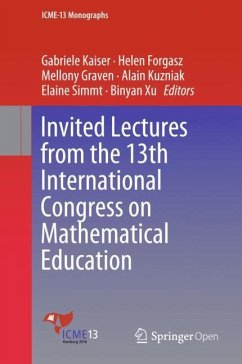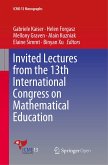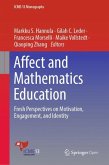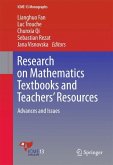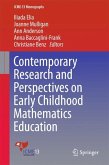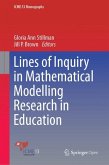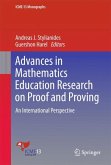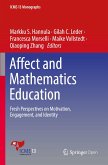Invited Lectures from the 13th International Congress on Mathematical Education
Herausgegeben:Kaiser, Gabriele; Forgasz, Helen; Graven, Mellony; Kuzniak, Alain; Simmt, Elaine; Xu, Binyan
Invited Lectures from the 13th International Congress on Mathematical Education
Herausgegeben:Kaiser, Gabriele; Forgasz, Helen; Graven, Mellony; Kuzniak, Alain; Simmt, Elaine; Xu, Binyan
- Gebundenes Buch
- Merkliste
- Auf die Merkliste
- Bewerten Bewerten
- Teilen
- Produkt teilen
- Produkterinnerung
- Produkterinnerung
The book presents the Invited Lectures given at 13th International Congress on Mathematical Education (ICME-13). ICME-13 took place from 24th- 31st July 2016 at the University of Hamburg in Hamburg (Germany). The congress was hosted by the Society of Didactics of Mathematics (Gesellschaft für Didaktik der Mathematik - GDM) and took place under the auspices of the International Commission on Mathematical Instruction (ICMI). ICME-13 - the biggest ICME so far - brought together about 3500 mathematics educators from 105 countries, additionally 250 teachers from German speaking countries met for…mehr
Andere Kunden interessierten sich auch für
![Invited Lectures from the 13th International Congress on Mathematical Education Invited Lectures from the 13th International Congress on Mathematical Education]() Invited Lectures from the 13th International Congress on Mathematical Education40,99 €
Invited Lectures from the 13th International Congress on Mathematical Education40,99 €![Affect and Mathematics Education Affect and Mathematics Education]() Affect and Mathematics Education39,99 €
Affect and Mathematics Education39,99 €![Research on Mathematics Textbooks and Teachers' Resources Research on Mathematics Textbooks and Teachers' Resources]() Research on Mathematics Textbooks and Teachers' Resources154,99 €
Research on Mathematics Textbooks and Teachers' Resources154,99 €![Contemporary Research and Perspectives on Early Childhood Mathematics Education Contemporary Research and Perspectives on Early Childhood Mathematics Education]() Contemporary Research and Perspectives on Early Childhood Mathematics Education112,99 €
Contemporary Research and Perspectives on Early Childhood Mathematics Education112,99 €![Lines of Inquiry in Mathematical Modelling Research in Education Lines of Inquiry in Mathematical Modelling Research in Education]() Lines of Inquiry in Mathematical Modelling Research in Education39,99 €
Lines of Inquiry in Mathematical Modelling Research in Education39,99 €![Advances in Mathematics Education Research on Proof and Proving Advances in Mathematics Education Research on Proof and Proving]() Advances in Mathematics Education Research on Proof and Proving119,99 €
Advances in Mathematics Education Research on Proof and Proving119,99 €![Affect and Mathematics Education Affect and Mathematics Education]() Affect and Mathematics Education39,99 €
Affect and Mathematics Education39,99 €-
-
-
The book presents the Invited Lectures given at 13th International Congress on Mathematical Education (ICME-13). ICME-13 took place from 24th- 31st July 2016 at the University of Hamburg in Hamburg (Germany). The congress was hosted by the Society of Didactics of Mathematics (Gesellschaft für Didaktik der Mathematik - GDM) and took place under the auspices of the International Commission on Mathematical Instruction (ICMI). ICME-13 - the biggest ICME so far - brought together about 3500 mathematics educators from 105 countries, additionally 250 teachers from German speaking countries met for specific activities. The scholars came together to share their work on the improvement of mathematics education at all educational levels.. The papers present the work of prominent mathematics educators from all over the globe and give insight into the current discussion in mathematics education. The Invited Lectures cover a wide spectrum of topics, themesand issues and aim to give direction to future research towards educational improvement in the teaching and learning of mathematics education. This book is of particular interest to researchers, teachers and curriculum developers in mathematics education.
Produktdetails
- Produktdetails
- ICME-13 Monographs
- Verlag: Springer / Springer International Publishing / Springer, Berlin / Universität Hamburg
- Artikelnr. des Verlages: 978-3-319-72169-9
- 1st ed. 2018
- Seitenzahl: 796
- Erscheinungstermin: 6. Februar 2018
- Englisch
- Abmessung: 241mm x 160mm x 48mm
- Gewicht: 1362g
- ISBN-13: 9783319721699
- ISBN-10: 3319721690
- Artikelnr.: 49698723
- Herstellerkennzeichnung Die Herstellerinformationen sind derzeit nicht verfügbar.
- ICME-13 Monographs
- Verlag: Springer / Springer International Publishing / Springer, Berlin / Universität Hamburg
- Artikelnr. des Verlages: 978-3-319-72169-9
- 1st ed. 2018
- Seitenzahl: 796
- Erscheinungstermin: 6. Februar 2018
- Englisch
- Abmessung: 241mm x 160mm x 48mm
- Gewicht: 1362g
- ISBN-13: 9783319721699
- ISBN-10: 3319721690
- Artikelnr.: 49698723
- Herstellerkennzeichnung Die Herstellerinformationen sind derzeit nicht verfügbar.
Forword, Gabriele Kaiser.- Practice-based Initial Teacher Education: Developing Inquiring Professionals, Glenda Anthony.- Mathematical experiments - an ideal first step into mathematics, Albrecht Beutelspacher.- Intersections of Culture, Language, And Mathematics Education: Looking Back And Looking Ahead, Marta Civil.- The Double Continuity in Algebra, Al Cuoco, William McCallum.- A Friendly Introduction to "Knowledge In Pieces": Modeling Types of Knowledge and their roles in Learning, Andrea diSessa.- History of Mathematics, Mathematics Education, and the Liberal Arts, Michael N. Fried.- Knowledge and Action for Change through Culture, Community and Curriculum, Linda Furuto.- The Impact and Challenges of Early Mathematics Intervention in an Australian Context, Ann Gervasoni.- Helping teacher educators in institutions of higher learning to prepare prospective and practicing teachers to teach mathematics, Herbert Ginsburg.- Hidden connections and double meanings: A mathematical viewpoint of affective and cognitive interactions in learning, Inés María Gómez-Chacón.- The Role of Algebra in School Mathematics, Liv Sissel Grønmo.- Storytelling for tertiary mathematics students, Ansie Harding.- PME and the international community of mathematics education, Rina Hershkowitz, Stefan Ufer.- ICMI 1966-2016: A double insiders' view of the latest half century of the International Commission on Mathematical Instruction, Bernard R. Hodgson, Mogens Niss.- Formative Assessment in Inquiry based Elementary Mathematics, Alena Hospesová.- Professional development of mathematics teachers: Through the lens of the camera, Ronnie Karsenty.- Powering Knowledge vs. Pouring Facts, Petar Kenderov.- Mathematical Problem Solving in Choice-Affluent Environments, Boris Koichu.- Natural Differentiation - An Approach to Cope with Heterogeneity, Günter Krauthausen.- Changes in Attitudes Towards Textbook Task Modification Using Confrontation of Complexity in a Collaborative Inquiry: Two Case Studies, Kyeong-Hwa Lee.- How can cognitive Neuroscience contribute to Mathematics Education? Bridging the two research areas, Roza Leikin.- Themes in Mathematics Teacher Professional learning research in South Africa: A Review of the Period 2006-2015, Mdutshekelwa Ndlovu.- Pedagogies of Emergent Learning, Ricardo Nemirovsky.- Connecting Mathematics, Community, Culture and Place: Promise, Possibilities, and Problems, Cynthia Nicol.- Relevance of learning logical Analysis of Mathematical Statements, Judith Njomgang Ngansop.- Understanding and Visualizing Linear Transformations, Asuman Oktac.- Mapping the Relationship between written and enacted Curriculum: Examining teachers' decision making, Janine Remillard.- Building Bridges Between Math Education and Engineering Education Communities: a dialogue through Modelling and Simulation, Ruth Rodriguez.- Constructing dynamic geometry: insights from a study of teaching practices in English schools, Kenneth Ruthven.- Exploring the Contribution of Gestures to Mathematical Argumentation Processes in a Semiotic Perspective, Cristina Sabena.- Improving Mathematics Pedagogy through Student/Teacher Valuing: Lessons from five Continents, Wee Tiong Seah.- About a collaborative work. Exploring the Functional World in a Computer Enriched Environment, Carmen Sessa.- Re-centring the individual in participatory accounts of professional identity, Jeppe Skott.- Enactive metaphorising in the learning of mathematics, Jorge Soto-Andrade.- Number Sense in Elementary School Children from different Social Backgrounds: The uses and Meanings Given to Numbers, Alina Galvão Spinillo.- Uncovering Chinese Pedagogy: Spiral Variation-The Unspoken Principle of Algebra Thinking to Develop Chinese Curriculum and instruction of "Two Basics", Xuhua Sun.- Digital Pedagogy in Mathematics Learning, Yahya Tabesh.- Activity Theory in French Didactic Research, Fabrice Vandebrouck.- The effect of a video-based intervention on the knowledge-based reasoning of future mathematics teachers, Nada Vondrová.- Popularization of the of Probability Theory and Statistics in School Through Intellectual Competitions, Ivan Vysotskiy.- Noticing in Pre-Service Teacher Education: Research Lessons as a context for reflection on learners' Mathematical Reasoning and Sense-Making, Helena Wessels.- Dialogues on Numbers: Script-writing as approximation of practice, Rina Zazkis.- Equity in mathematics education: What did TIMSS and PISA tell us in the last two decades? Yan Zhu.
Forword, Gabriele Kaiser.- Practice-based Initial Teacher Education: Developing Inquiring Professionals, Glenda Anthony.- Mathematical experiments - an ideal first step into mathematics, Albrecht Beutelspacher.- Intersections of Culture, Language, And Mathematics Education: Looking Back And Looking Ahead, Marta Civil.- The Double Continuity in Algebra, Al Cuoco, William McCallum.- A Friendly Introduction to "Knowledge In Pieces": Modeling Types of Knowledge and their roles in Learning, Andrea diSessa.- History of Mathematics, Mathematics Education, and the Liberal Arts, Michael N. Fried.- Knowledge and Action for Change through Culture, Community and Curriculum, Linda Furuto.- The Impact and Challenges of Early Mathematics Intervention in an Australian Context, Ann Gervasoni.- Helping teacher educators in institutions of higher learning to prepare prospective and practicing teachers to teach mathematics, Herbert Ginsburg.- Hidden connections and double meanings: A mathematical viewpoint of affective and cognitive interactions in learning, Inés María Gómez-Chacón.- The Role of Algebra in School Mathematics, Liv Sissel Grønmo.- Storytelling for tertiary mathematics students, Ansie Harding.- PME and the international community of mathematics education, Rina Hershkowitz, Stefan Ufer.- ICMI 1966-2016: A double insiders' view of the latest half century of the International Commission on Mathematical Instruction, Bernard R. Hodgson, Mogens Niss.- Formative Assessment in Inquiry based Elementary Mathematics, Alena Hospesová.- Professional development of mathematics teachers: Through the lens of the camera, Ronnie Karsenty.- Powering Knowledge vs. Pouring Facts, Petar Kenderov.- Mathematical Problem Solving in Choice-Affluent Environments, Boris Koichu.- Natural Differentiation - An Approach to Cope with Heterogeneity, Günter Krauthausen.- Changes in Attitudes Towards Textbook Task Modification Using Confrontation of Complexity in a Collaborative Inquiry: Two Case Studies, Kyeong-Hwa Lee.- How can cognitive Neuroscience contribute to Mathematics Education? Bridging the two research areas, Roza Leikin.- Themes in Mathematics Teacher Professional learning research in South Africa: A Review of the Period 2006-2015, Mdutshekelwa Ndlovu.- Pedagogies of Emergent Learning, Ricardo Nemirovsky.- Connecting Mathematics, Community, Culture and Place: Promise, Possibilities, and Problems, Cynthia Nicol.- Relevance of learning logical Analysis of Mathematical Statements, Judith Njomgang Ngansop.- Understanding and Visualizing Linear Transformations, Asuman Oktac.- Mapping the Relationship between written and enacted Curriculum: Examining teachers' decision making, Janine Remillard.- Building Bridges Between Math Education and Engineering Education Communities: a dialogue through Modelling and Simulation, Ruth Rodriguez.- Constructing dynamic geometry: insights from a study of teaching practices in English schools, Kenneth Ruthven.- Exploring the Contribution of Gestures to Mathematical Argumentation Processes in a Semiotic Perspective, Cristina Sabena.- Improving Mathematics Pedagogy through Student/Teacher Valuing: Lessons from five Continents, Wee Tiong Seah.- About a collaborative work. Exploring the Functional World in a Computer Enriched Environment, Carmen Sessa.- Re-centring the individual in participatory accounts of professional identity, Jeppe Skott.- Enactive metaphorising in the learning of mathematics, Jorge Soto-Andrade.- Number Sense in Elementary School Children from different Social Backgrounds: The uses and Meanings Given to Numbers, Alina Galvão Spinillo.- Uncovering Chinese Pedagogy: Spiral Variation-The Unspoken Principle of Algebra Thinking to Develop Chinese Curriculum and instruction of "Two Basics", Xuhua Sun.- Digital Pedagogy in Mathematics Learning, Yahya Tabesh.- Activity Theory in French Didactic Research, Fabrice Vandebrouck.- The effect of a video-based intervention on the knowledge-based reasoning of future mathematics teachers, Nada Vondrová.- Popularization of the of Probability Theory and Statistics in School Through Intellectual Competitions, Ivan Vysotskiy.- Noticing in Pre-Service Teacher Education: Research Lessons as a context for reflection on learners' Mathematical Reasoning and Sense-Making, Helena Wessels.- Dialogues on Numbers: Script-writing as approximation of practice, Rina Zazkis.- Equity in mathematics education: What did TIMSS and PISA tell us in the last two decades? Yan Zhu.

